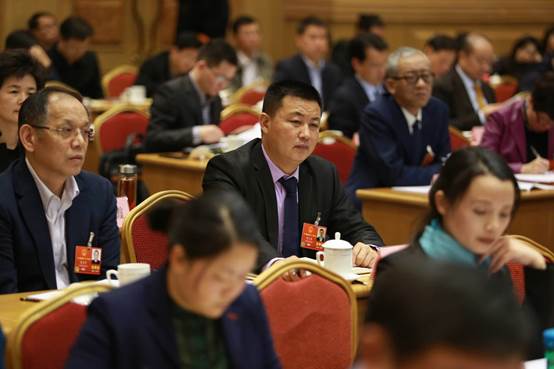An OUC alumnus from Wuhan RTVU attended the National People’s Congress (NPC) and Chinese People’s Political and Consultative Conference (CPPCC), also known as “Two Sessions” in 2018. His name is Zhang Wenxi, deputy monitor of the Spring 2012 Agriculture and Economy Management class and one of the first session of graduates from the junior college class for the talent cultivation project of Xinzhou district rural village class. As the only grassroots-level farmer deputy to the Two Sessions from Wuhan, Zhang Wenxi brought with him a number of proposals.
Despite of his tight schedule, Zhang Wenxi accepted our invitation to share his experiences at the Two Sessions.
Zhang Wenxi is secretary of the Party branch and director of the Village Commission in Chenyu Village, Pantang Street, Xinzhou District. Zhang proposed that the central government support the development of a national-level Yangtze new area in Wuhan and enlarge its support for agricultural industries and rural infrastructure construction.
Zhang Wenxi was impressed by many of the speeches and events he witnessed at the Two Sessions.
“Applause” was one of them: whenever Chairman Xi Jinping entered the the Great Hall of the People, all of the deputies would applaud simultaneously. Sixty rounds of applause were given to Premier Li Keqiang during his presentation of the government work report, proving that the government work under the guidance of Xin Jinping’s New Era Socialism with Chinese Characteristics has been highly recognised and praised by people around the country.
Thundering applause was heard when Wang Chen, vice chairman of the Standing Committee of National People’s Congress, announced that the amendment to the constitution was approved by a vote of 2,958.
Zhang Wenxi also noted that the leaders all care about the “small things”, whereas the public care about the “big things.” The government attaches great importance to livelihood, for instance. Xi Jinping has called for the promotion of a “Toilet Revolution” and cares greatly about the poverty alleviation industries. For example, the government work report states that efforts should be made to increase the income of rural teachers, promote a nutrition improvement plan, increase internet speed and reduce its cost by 30%, and remove or simplify the certificates required by governmental administration organisations.
Zhang Wenxi was also deeply inspired by the deeds of the other deputies. In Hubei deputy group, Wang Jianqing told his story of “Craftsman Spirit.” Liu Jinxiu, a shepherdess from Dabieshan mountain, talked about how she started working on her own at the age of 13 and then grew up to be director-general of Luotian County Jinxiu Forestry and Livestock Farming Cooperative and a chairperson of Hubei Mingyang Agriculture and Technology Development Co., Ltd. board. She led the villagers to breed sheep and get rich, aiding the poverty-alleviation cause of the Dabieshan Mountain areas. Cheng Pingji turned down an office job and went back to the country to be a secretary at the Party branch dedicating her life to her village. Cheng said, “I shall not get married until the villagers get rid of poverty.”
Zhang Wenxi was surprised to see that, this year, the Hubei deputy group consisted of seven academicians, nine professors, and some general engineers. It made him realise that the future of a country depends on its education.
As a RTVU scholarship winner, Zhang Wenxi said, “I am grateful to the RTVU, my teachers, and classmates”. Zhang wrote down his wishes for the RTVU students: “Everyone has a dream and everyone is longing for success. To realise one’s dream, study hard and make bold innovations in order to realise the China Dream.”

Zhang Wenxi, an alumnus from Wuhan RTVU, attended the Two Sessions
By Wuhan RTVU